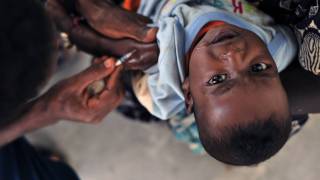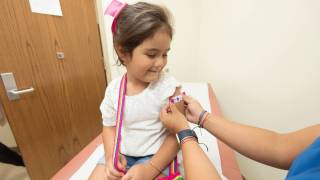Addressing Parental Vaccine Concerns

Most parents recognize that immunization is important for their children's well-being.
Unfortunately, vaccines may have become victims of their own success.
With the reduction of various diseases, some parents think that the vaccines themselves are the new danger.
‘Between 10 percent and 15 percent of parents are asking physicians to space out the timing of vaccines, which often poses an ethical dilemma for physicians,” said Jason Glanz, Ph.D., an epidemiologist and senior research investigator at Kaiser Permanente Colorado, Institute for Health Research.
‘Childhood immunization involves a balance between parents’ autonomy in deciding whether to immunize their children and the benefits to public health from mandating vaccines,’ said Dr. Glanz in a recent study.
There is more than one way to understand parents' views about immunization, reports the American Academy of Pediatrics.
Some parents have virtually no vaccination information. And when they are offered data about vaccine harms and benefits, parents usually give permission for their child to be immunized.
Other parents may have inaccurate information which can easily be corrected by offering the latest research.
And yet others, have a great deal of information and a firm philosophical stance that immunization is not what is best for their child.
“Providers can positively impact immunization rates by listening to the concerns of parents, combatting any misinformation with strong evidence-based research, and allowing the parents to make informed decisions”, said Chris Felton, PharmD, MTM Clinical Pharmacist at Brookshire Grocery Company.
“It is incumbent upon us to know all of the information that our patients are hearing…good and bad so that we can engage with them in a constructive conversation, “ added Felton.
In the United States, the American Academy of Pediatrics (AAP) Committee on Bioethics has noted that when immunization rates are high and disease prevalence is low, the risk to others from unimmunized children “does not usually pose a significant-enough health risk to others to justify state action.”
Even after discussion, some parents may feel that they do not receive sufficient information about the risks and benefits of vaccines and the risks of illnesses they are intended to prevent.
These observations help explain the lack of confidence in childhood immunization programs that underlie some parents' decisions not to vaccinate.
The AAP offered these suggestions:
- In advising parents, healthcare practitioners should provide full information in clear language about the risks and benefits of immunization and the diseases targeted and information on the efficacy and risks of alternatives, including vaccine refusal. Information needs to be presented in a way that best supports informed decision-making, which ensures that parents have the necessary foundation for making sound decisions.
- Providers should tell parents when their beliefs about the vaccine in question are unsupported or disproved by evidence.
- Providers can discontinue professional services to a patient but must comply with applicable legal and ethical requirements when severing the doctor-patient relationship.
- Public educational campaigns should widely disseminate accurate information.
- Policy-makers should consider reforming compensation systems to introduce no-fault compensation if a child should suffer a vaccine-related injury.
The occurrence of vaccine-associated adverse events cannot be denied, but they are rare.
In these instances, the National Vaccine Injury Compensation Program (VICP) may provide financial compensation to individuals who file a petition and are found to have been injured by a VICP-covered vaccine.
During 2015, the Secretary of Health and Human Services published in the Federal Register a notice of proposing revisions to the Vaccine Injury Table.
This rule change is perhaps the single most important change in the vaccine court in favor of the injured and gives individuals an easier path to recovery.
One of the purposes of the rule change – the other was to add Guillain-Barre Syndrome to the Vaccine Table - was to add Shoulder Injury Related to Vaccine Administration (SIRVA) injuries to the vaccine chart.
Quite simply, a SIRVA results when a person suffers a shoulder injury when the vaccine is administered.
In addition, anyone who suffers a SIRVA injury within 48 hours of receipt of any vaccine on the Vaccine Injury Table, will also be given the presumption of causation.
Second, the 2015 rule change effectively reopens the statute of limitations period for cases that were previously time-barred.
The provision that “an individual who may be eligible to file a petition based on the revised Table may file the petition for compensation not later than two years after the effective date of the revision if the alleged injury or death occurred not more than 8 years before the effective date of the revision.”
This effectively means that any case where the client developed a SIRVA case within 48 hours of any table vaccination, that occurred after March 21, 2009, are timely if they are filed before March 21, 2019.
“On behalf of attorneys that represent those injured from the administration of vaccines, we hope that this rule change will streamline the process for those injured to recover from the Vaccine Injury Compensation Fund,” said David J. Carney, an attorney at Anapol Weiss.
Any individual, of any age, who received a covered vaccine and believes he or she was injured, as a result, can file a petition.
Parents, legal guardians, and legal representatives can file on behalf of children, disabled adults, and individuals who are deceased said Carney.
Funding for this project was partially provided by the SickKids Foundation (Toronto, Ontario, Canada). Dr. Vohra received salary support from the Alberta Heritage Foundation for Medical Research and the Canadian Institutes of Health Research.
Our Trust Standards: Medical Advisory Committee


























